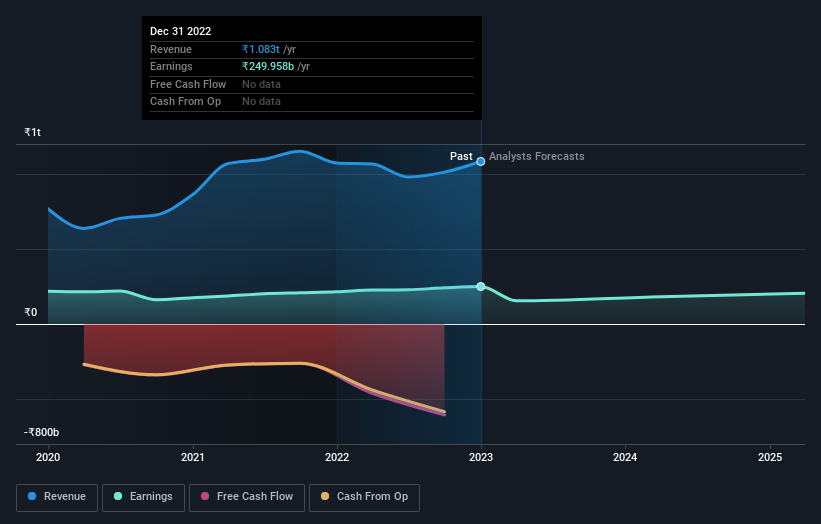- India
- /
- Diversified Financial
- /
- NSEI:HDFC
With 56% ownership, Housing Development Finance Corporation Limited (NSE:HDFC) boasts of strong institutional backing

Key Insights
- Significantly high institutional ownership implies Housing Development Finance's stock price is sensitive to their trading actions
- 43% of the business is held by the top 25 shareholders
- Using data from company's past performance alongside ownership research, one can better assess the future performance of a company
A look at the shareholders of Housing Development Finance Corporation Limited (NSE:HDFC) can tell us which group is most powerful. We can see that institutions own the lion's share in the company with 56% ownership. Put another way, the group faces the maximum upside potential (or downside risk).
Given the vast amount of money and research capacities at their disposal, institutional ownership tends to carry a lot of weight, especially with individual investors. Hence, having a considerable amount of institutional money invested in a company is often regarded as a desirable trait.
In the chart below, we zoom in on the different ownership groups of Housing Development Finance.
See our latest analysis for Housing Development Finance

What Does The Institutional Ownership Tell Us About Housing Development Finance?
Many institutions measure their performance against an index that approximates the local market. So they usually pay more attention to companies that are included in major indices.
Housing Development Finance already has institutions on the share registry. Indeed, they own a respectable stake in the company. This implies the analysts working for those institutions have looked at the stock and they like it. But just like anyone else, they could be wrong. It is not uncommon to see a big share price drop if two large institutional investors try to sell out of a stock at the same time. So it is worth checking the past earnings trajectory of Housing Development Finance, (below). Of course, keep in mind that there are other factors to consider, too.

Institutional investors own over 50% of the company, so together than can probably strongly influence board decisions. Housing Development Finance is not owned by hedge funds. Life Insurance Corporation of India, Asset Management Arm is currently the company's largest shareholder with 5.0% of shares outstanding. SBI Funds Management Limited is the second largest shareholder owning 3.8% of common stock, and GIC Private Limited holds about 3.5% of the company stock.
On studying our ownership data, we found that 25 of the top shareholders collectively own less than 50% of the share register, implying that no single individual has a majority interest.
While it makes sense to study institutional ownership data for a company, it also makes sense to study analyst sentiments to know which way the wind is blowing. There is some analyst coverage of the stock, but it could still become more well known, with time.
Insider Ownership Of Housing Development Finance
While the precise definition of an insider can be subjective, almost everyone considers board members to be insiders. Management ultimately answers to the board. However, it is not uncommon for managers to be executive board members, especially if they are a founder or the CEO.
I generally consider insider ownership to be a good thing. However, on some occasions it makes it more difficult for other shareholders to hold the board accountable for decisions.
Our most recent data indicates that insiders own less than 1% of Housing Development Finance Corporation Limited. It is a very large company, so it would be surprising to see insiders own a large proportion of the company. Though their holding amounts to less than 1%, we can see that board members collectively own ₹38b worth of shares (at current prices). Arguably recent buying and selling is just as important to consider. You can click here to see if insiders have been buying or selling.
General Public Ownership
With a 43% ownership, the general public, mostly comprising of individual investors, have some degree of sway over Housing Development Finance. While this group can't necessarily call the shots, it can certainly have a real influence on how the company is run.
Next Steps:
It's always worth thinking about the different groups who own shares in a company. But to understand Housing Development Finance better, we need to consider many other factors. Case in point: We've spotted 2 warning signs for Housing Development Finance you should be aware of, and 1 of them is a bit concerning.
Ultimately the future is most important. You can access this free report on analyst forecasts for the company.
NB: Figures in this article are calculated using data from the last twelve months, which refer to the 12-month period ending on the last date of the month the financial statement is dated. This may not be consistent with full year annual report figures.
If you're looking to trade Housing Development Finance, open an account with the lowest-cost platform trusted by professionals, Interactive Brokers.
With clients in over 200 countries and territories, and access to 160 markets, IBKR lets you trade stocks, options, futures, forex, bonds and funds from a single integrated account.
Enjoy no hidden fees, no account minimums, and FX conversion rates as low as 0.03%, far better than what most brokers offer.
Sponsored ContentValuation is complex, but we're here to simplify it.
Discover if Housing Development Finance might be undervalued or overvalued with our detailed analysis, featuring fair value estimates, potential risks, dividends, insider trades, and its financial condition.
Access Free AnalysisHave feedback on this article? Concerned about the content? Get in touch with us directly. Alternatively, email editorial-team (at) simplywallst.com.
This article by Simply Wall St is general in nature. We provide commentary based on historical data and analyst forecasts only using an unbiased methodology and our articles are not intended to be financial advice. It does not constitute a recommendation to buy or sell any stock, and does not take account of your objectives, or your financial situation. We aim to bring you long-term focused analysis driven by fundamental data. Note that our analysis may not factor in the latest price-sensitive company announcements or qualitative material. Simply Wall St has no position in any stocks mentioned.
About NSEI:HDFC
Housing Development Finance
Housing Development Finance Corporation Limited provides housing finance to individuals and corporate customers in India.
Established dividend payer with proven track record.
Similar Companies
Market Insights
Community Narratives



